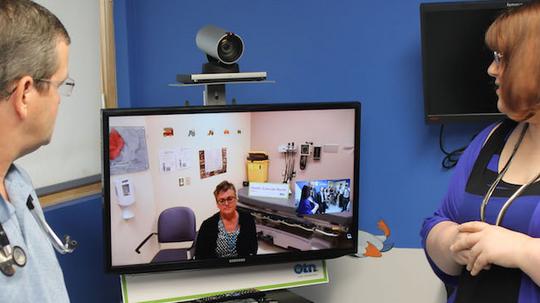
As a family medicine physician and health service innovation researcher, Freya Spielberg has dedicated most of her career to improving health outcomes in vulnerable populations.
She spent years researching ways to bring high quality healthcare to those who struggle to afford it, but Spielberg says she grew tired of the limitations that grant-funded research brings with it.
"I've shown many times that it's possible to design a program that improves outcomes and lowers costs, but in the research world, every time a grant ends, even when you show that the research is successful, the program ends," she said.
Enter Urgent Wellness, Spielberg's social enterprise startup. The company says its mission is to design a new healthcare system that makes care more convenient, provides health education and tracks preventive care.
"We're bringing together all the cutting edge technologies and health system solutions to really make an impact on the health of vulnerable populations, but in a way that will be sustainable," she said.
Urgent Wellness will overcome the barriers that keep low-income or low-accessibility populations from accessing quality medical attention by bringing healthcare straight to where they are. They plan to open Urgent Wellness centers in areas where there's the biggest need, like homeless shelters and housing projects.
Each center will be equipped with telemedicine machines, allowing physicians to examine acute cases in patients remotely. The machines are set up with abilities to listen to the heart, the lungs, to look at the ears and throat. They even have cameras built in to let doctors take a look at the skin. The doctor communicates with the patient through a screen, and community health workers, based in the Urgent Wellness centers, act as liaisons between the telemedicine technology and the patient.
The company, which has a core team of four, has raised $125,000 to date. Most of the funding came from investor John Barabino, but they won $25,000 in April after winning George Washington University's New Venture Competition.
Barabino will serve as CEO for the time being, said Spielberg. Since she's a full-time faculty member at GW, she will stay on as president of the board and Chief Scientific Advisor.
They plan on opening their first center in October, in the Benning Terrace housing project in southeast D.C.
Initially, they're looking at places that have free rooms for Urgent Wellness centers. Eventually, though, they'll be designing stand alone kiosks that can operate from parking lots, for example.
"It used to be in medicine that we were trained [not to] mess with anybody's medications if you weren't their primary care provider, and I think we need to change that paradigm," she said. "We really need to have a 'no missed opportunities' approach so that anytime someone accesses the healthcare system, their preventive care is checked on, their chronic disease management is optimized."
"That can happen more easily now because we have technology that can help follow people longitudinally and alert whoever the provider is of what is needed. So, it really is a change in the way we think about optimizing medical care."
Urgent Wellness will help keep chronic diseases, like diabetes or hypertension, under control, even if the patient can't access his or her primary care doctor. It will also, said Spielberg, help reduce unnecessary emergency room visits, and in turn, bring down patient costs.
Instead of focusing on the needs of the healthcare providers, she said, Urgent Wellness will focus more on the needs of the patients.
"If you look at what the needs are of the population, it's very difficult to schedule appointments and get to appointments because of chaotic lives and competing priorities that many of the people face," she said. "So that's why, if you're designing something specifically for that population, to meet their needs, you need look at what the barriers are and you design it to overcome those barriers."
That means bringing healthcare to where they are, instead of opening clinics in remote areas that require transportation. It means providing childcare, or walk-in acute care.
It also means, Spielberg says, providing a greater focus on healthcare literacy. If patients understand their own needs, they are more likely to seek out appropriate help.
"Of course, anytime there's change, there is resistance," she said. But, she added, if they're able to provide their patients with higher quality healthcare, then doctors can, in turn, spend more time in the higher level management that their expertise is required in.
"And that'll be a win for the patients, a win for public health, and a win for the primary care providers," she said.
Image used via CC BY-SA 4.0 - Credit Rosie.Andre




